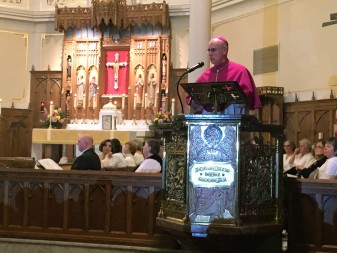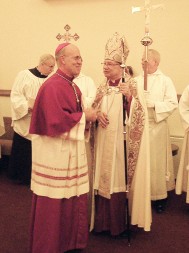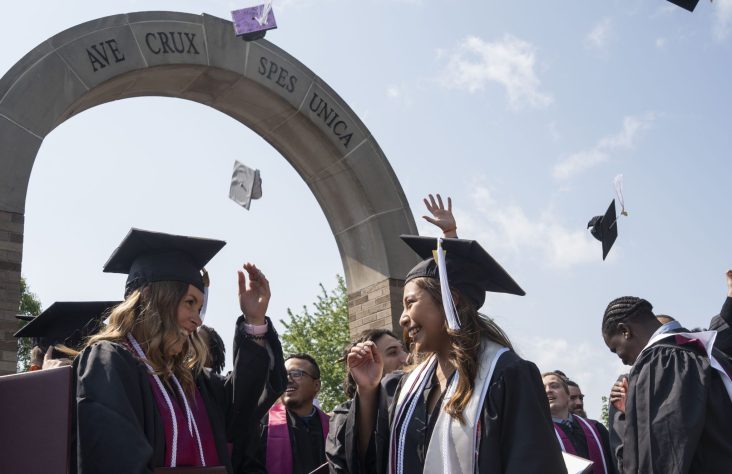January 27, 2016 // Local
Evensong ecumenical vespers joins voices in prayer for unity

Bishop Kevin C. Rhoades offered the homily at the Ecumenical Evensong on Jan. 24 at Trinity Episcopal Church. The combined choirs of Trinity Episcopal Church and the Cathedral of Immaculate Conception, directed by Michael Dulac of the cathedral, provided the music. Bishop Edward Little of the Episcopal Diocese of Northern Indiana was the officiant of the service, which marked the Week of Christian Unity.
By Tim Johnson
FORT WAYNE — Bishop Kevin C. Rhoades was the homilist at the Evensong Ecumenical Vespers on Sunday, Jan. 24, in Trinity Episcopal Church in downtown Fort Wayne. The event was part of the Week of Christian Unity celebrations, which began on Jan. 18, the feast of St. Peter’s Chair, and concluded Jan. 25, the feast of the Conversion of St. Paul.
The week of prayer has a history of over 100 years. This year’s theme was “Called to Proclaim the Mighty Acts of the Lord” from Peter.
Shawn Storer, coordinator of the diocesan Ecumenical Office, echoed the words of Pope Francis who recently reminded the faithful: “This Week of Prayer invites us to reflect on, and bear witness to, our unity in Christ as God’s people. All the baptized, reborn to new life in Christ, are brothers and sisters, despite our divisions. Through Baptism we have been charged, as St. Peter tells us, ‘to proclaim the mighty works of the One who has called us out of darkness into His marvelous light.’ During this Week of Prayer, let us ask the Lord to help all Christians to grow in that unity which is greater than what divides us. Together, may we respond to His call to share with others, especially with the poor and forgotten of our world, the gift of divine mercy which we ourselves have received.”
The Right Rev. Edward Stuart Little, Bishop of the Episcopal Diocese of Northern Indiana, was the officiant at the service. Clergy from local Christian denominations were also invited to attend.
The sung office of Evening Prayer in the Anglican tradition was led by the combined choirs of the Trinity Episcopal Church and the Cathedral of the Immaculate Conception in Fort Wayne.
In the homily, Bishop Rhoades said, “We are used to the divisions within the Christian community, divisions that go back centuries. But these divisions are not natural. They are not good. They are wounds to the Body of Christ. They impair and impede the Church’s evangelizing mission in the world.”

Bishop Kevin C. Rhoades chats with Bishop Edward Little of the Episcopal Diocese of Northern Indiana marking the Week of Christian Unity.
There is a temptation to indifference and complacency in the face of Christian disunity. Bishop Rhoades noted, “We are here because we believe that it is God’s will that we be one. We know very well that there are many obstacles to the reestablishment of full communion among Christians. Rather than succumb to a sterile pessimism, we ask the Lord for the grace of renewed determination to pursue, with courage and generosity, the unity, which is His will.”
Bishop Rhoades encouraged all to pray for the persecuted brothers and sisters, especially the Christians of Syria and Iraq. “They are witnesses to Jesus Christ and are persecuted because they are Christians,” Bishop Rhoades said. “ISIS makes no distinction among Christian denominations. They don’t ask those they capture: are you Anglican or Catholic or Orthodox or Protestant? They ask: ‘are you Christians?’ It is for their Christian faith that they are persecuted and even sometimes tortured and killed. This is what Pope Francis has called ‘the ecumenism of blood.’”
Bishop Rhoades spoke of the powerful witness of ecumenism. “May these contemporary martyrs inspire us in our faith and in our quest for Christian unity,” he said.
Ultimately unity among Christians is the work and gift of the Holy Spirit. “At the same time,” Bishop Rhoades said, “we have our part to play in cooperating with the Holy Spirit which requires, first and foremost, conversion. The Second Vatican Council taught that ‘there can be no ecumenism worthy of the name without a change of heart.’ Authentic conversion is needed.”
Bishop Rhoades spoke of the conversion of St. Paul: “Paul’s conversion can be a model for us, not necessarily in such a dramatic fashion, but a model nonetheless in its core content. Our conversion, our ongoing conversion, involves first and foremost our encounter with the Risen Christ and opening our eyes in faith to the illumination of His divine grace. To be converted means that, like St. Paul, we truly believe that Jesus has given Himself for us, that He died and rose, and that He lives with us and in us.”
“It means we let Him take us by the hand and lift us,” the bishop said quoting Pope Benedict XVI, “out of the quicksands of pride and sin, of deceit and sadness, of selfishness and of every false security, to know and live the richness of His love.”
The bishop added, “When we pray for Christian unity, we must pray for the grace of this conversion. It is not a coincidence that the end of the Week of Prayer for Christian Unity ends on the feast of the Conversion of St. Paul since the reunion of Christians can be attained only by way of conversion.”
He added, “It is also a great impetus to unity when we work together in proclaiming and serving the Gospel. I think, for example, of joining together in works of mercy and service of the poor and suffering.”
Bishop Rhoades spoke of his recent visit to Haiti to see many projects of Catholic Relief Services there: “I met several of the CRS staff that was composed not only of Catholics, but Christians of other denominations. Together they served the poor and vulnerable. This is an important part of ecumenical progress: bearing common witness to Christ in upholding the dignity of every human person, in caring for the earth, our common home, and in promoting peace and the common good.”
The best news. Delivered to your inbox.
Subscribe to our mailing list today.






